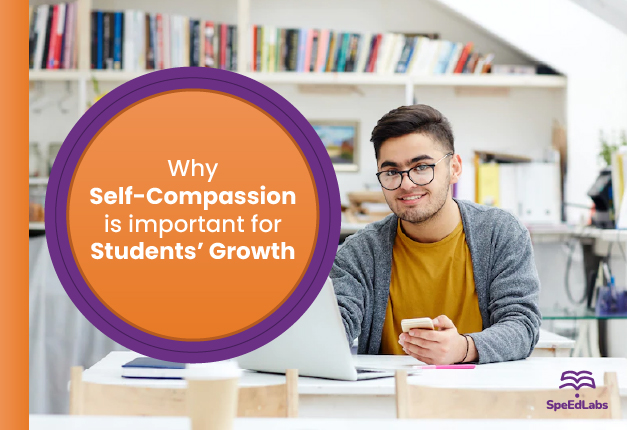What does it entail to be compassionate toward oneself? Do you treat yourself like a close friend when you make a mistake, or do you punish yourself severely?
The practice of quieting our inner critic and substituting it with a voice of support, understanding, and care for ourselves is known as self-compassion.
What Constitutes Self-Compassion?
- Kindness toward oneself means treating oneself with compassion and understanding rather than with harsh criticism and condemnation.
- Recognition of our shared humanity—instead of feeling alone and alienated by our suffering, we feel connected with others in the life experience.
- Instead of denying or exaggerating our suffering, we hold our experience in mindful awareness.
How can Self-Compassion prove to be Beneficial?
- Teens can feel better by practising self-compassion.
More life satisfaction, less stress, and negative emotions are all related to higher levels of self-compassion in adolescents.
The damaging effects of low self-esteem on adolescents’ mental health appear to be mitigated by self-compassion.
In at-risk youth, self-compassion is a protective factor against posttraumatic stress disorder, depression, and suicidality.
- Promoting wellbeing by increasing self-compassion.
Young people’s well-being and self-compassion are closely related. Similar findings have been found for adults, for whom self-compassion-building programmes have been shown to boost happiness and mindfulness while lowering stress, depression, and anxiety.
- Self-compassion improves our interpersonal communication.
Young people who have a higher level of self-compassion are more likely to be understanding of others’ viewpoints and more forgiving. They also tend to resolve interpersonal conflict in healthier ways, particularly by compromising rather than putting aside their feelings.
More self-compassionate individuals’ romantic partners describe them as supportive and less controlling and aggressive.
- Students who have greater self-compassion are more resilient.
Students who have self-compassion often set goals for their learning and development as opposed to attempting to impress others. They are more likely to have higher self-efficacy—a sense of assurance that they can succeed—and less failure fear.
When self-compassionate students make mistakes, they employ better coping mechanisms and are better able to recover. They are also more likely to ask questions, seek help, and talk to instructors outside of class.
- Self-improvement is motivated by self-compassion.
Self-compassionate people are more likely to accept responsibility for their past actions while also being less upset by them and are more driven to make improvements in their weak areas.
Self-compassion can help to lessen procrastination and the stress it causes.
- Having self-compassion keeps us in good health.
Self-compassion training has been linked to stronger immune systems and healthier reactions to physical stress. It also relates to a healthier body image and keeps people motivated to exercise, stop smoking, and maintain a healthy diet.
Self-Talk: Be your Best Friend
How do you talk to yourself when you are facing challenging circumstances? Do you tend to be harsh on yourself or would you treat yourself as you would a friend? Treating yourself like a good friend is one of the best ways to learn compassion for yourself.
Have you ever kept watch? Being loving, compassionate, and understanding with our friends is simpler. Most of us struggle when we make a mistake to feel the same love and compassion for ourselves.
Here is an exercise from Dr Kristin Neff that could help you be more self-compassionate:
Step 1
Think of your best friend as someone who is overly critical of themselves and is deeply disappointed. In this scenario, how would you approach them? Write down your usual behaviour or language on a piece of paper. How you typically converse with your friends should be noted.
Step 2
Take a moment to recall a time when you were disappointed and harsh with yourself. In these situations, how do you usually react to yourself? Pay attention to the tone in which you speak to yourself as you write down what you would do or say.
Step 3
Does the difference between the two differ significantly? If so, think about why that is.
Step 4
Consider it, and then describe how you would feel if you comfort yourself in the same way you would a close friend.
You are aware now! Kindness can go a long way, especially when it is applied to oneself.
A growth mindset that enables you to accept your flaws and mistakes can be created by using affirmations as a way to cultivate self-kindness. To transform into a positive achiever, make it a habit to replace your negative thoughts with positive ones.
Also published on Medium.
